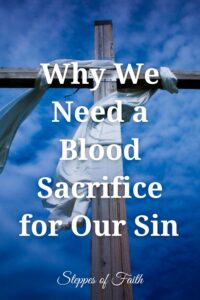
“Without shedding of blood, there is no remission.” Hebrews 9:22
Under Old Testament law, God required sacrificing animals and shedding their blood to forgive sin. A Levite priest would repeatedly offer sacrifices, expecting God to show mercy, but the sacrifices were never adequate to cover the cost of sin (Hebrews 10:11). The blood of bulls, goats, and doves could never accomplish the restitution we need. Only a perfect sacrifice could ever absolve us, and only God could provide it.
But why was the shedding of blood necessary to cleanse us from sin?
Shedding blood because of sin dates to the Garden of Eden when Adam and Eve disobeyed and ate the fruit. In response, God killed an animal to clothe them and restore them. Because He killed the animal (and not Adam or Eve), God established that the penalty of sin is death. The animal He killed was the first blood sacrifice (Genesis 3:21), which set the precedent of shed blood to ensure forgiveness. God later put this law in the Torah (the Law of Moses).
Because of the Torah, the Israelites regularly offered bulls, rams, goats, birds, and others during temple worship. The people sacrificed a lamb every Passover, and the High Priest presented a bull and a ram every Yom Kippur, the Day of Atonement. Each sacrifice was in keeping with the law in Leviticus 17:11, 14.
“For the life of the flesh is in the blood, and I have given it to you upon the altar to make atonement for your souls, for it is the blood that makes atonement for the soul.” (v11)
“For [the blood] is the life of all flesh. Its blood sustains its life.” (v14)
Because blood sustains life, its shedding represents the shedding of life (i.e., death). And because life is sacred and precious to God, blood is also sacred and precious (which is why much of Leviticus 17 centers on the forbiddance of eating or drinking blood).
Shed Blood and the Scapegoat
Another Levitical law involves a scapegoat. Every Yom Kippur, the High Priest cast lots on two goats. One died as a sin offering. The priest then prayed and put his hand on the other goat—the scapegoat—to cast the people’s sins onto it. The priest used the living goat to make atonement before the Lord. He then released the goat into the wilderness (Leviticus 16:8-10).
The definition of atonement is to make reparation for an injury or wrong. In the Bible, atonement means reconciliation between God and man. The scapegoat reconciled that relationship. But the other goat had to die to pay the penalty for the people’s sins. As a result, blood shed from a substitute (an animal) covers the sinner, who is then allowed to live. The blood sacrifice released the people from the consequences of their sins.
“Without shedding of blood, there is no remission.” Hebrews 9:22
The Jews kept these laws and rituals until 70 A.D., when the Romans destroyed the temple. The Jews have not made any sacrifices to God since.
The temple’s destruction does not mean there is no longer the necessity of shed blood for sins. Sin persists in each of our lives.
“For all have sinned and fallen short of the glory of God.” Romans 3:23
God knows we cannot save ourselves, and the Jews and others have proven that animal sacrifices are not enough. Only a perfect sacrifice will do.
Abraham’s Sacrifice
We see the first human example of substitutionary atonement in Genesis 22, when God instructs Abraham to sacrifice his son, Isaac, on Mount Moriah. Abraham built an altar there and prepared to kill his son by binding him and placing him on the altar. Verse twelve tells us God stopped Abraham before it was too late.
“And He said, ‘Do not lay your hand on the lad or do anything to him for now I know that you fear God since you have not withheld your son, your only son, from Me.”
Abraham looked up, and there stood a ram, which caught its horns in a bush. Abraham released Isaac and sacrificed the ram instead. God Himself provided the appropriate sacrifice and further demonstrated that blood is necessary to forgive sin. (Interestingly, Mount Moriah is where the Israelites later built the temple; its remains are still there, including the famous Western Wall.)
God provided the perfect sacrifice for Abraham. He later provided it when He sent Jesus to die on a cross. Just as God restored Adam and Eve and Abraham with a blood sacrifice, the Messiah Jesus came to restore all of humanity. Only He lived a sinless life and could adequately atone for man’s sins.

Jesus’ Blood Cleanses Our Sin
The Israelites held ritual sacrifices for hundreds of years to atone for their sins. Other world religions also do this, but it will never be enough. Animal sacrifice could only partially and temporarily cover sin, which is why the High Priest had to repeat it regularly. But Jesus’s shed blood cleanses it and removes it forever.
“‘ Come now, let us reason together,’ says the LORD, ‘Though your sins are like scarlet, they shall be as white as snow. Though they are red like crimson, they shall be as wool.’” Isaiah 1:1
As part of the triune godhead, Jesus is holy just as God the Father is holy. Jesus’ holiness set Him apart from every other being. He gave His pure and sinless life in exchange for our sin-filled life. His holy blood was shed in our place, making future sacrifices unnecessary. He was and will always be the perfect substitute. Animals are not holy, so their blood can never be enough to cleanse and absolve us from sin.
“But He was wounded for our transgressions. He was bruised for our iniquities. The chastisement for our peace was upon Him, and by His stripes, we are healed.” Isaiah 53:5
The apostle Paul reminds us of the need for the cleansing we have when we put our faith in Jesus.
“Now this I say, brethren, that flesh and blood cannot inherit the kingdom of God, nor does corruption inherit incorruption. For this corruptible must put on incorruption, and this mortal must put on immortality. So when this corruptible has put on incorruption, and this mortal has put on immortality, then shall be brought to pass the saying that is written: ‘Death is swallowed up in victory.’” 1 Corinthians 15:50, 53-54
We cannot see heaven unless we put on the “incorruptible,” which is Jesus’ righteousness. His righteousness and holiness cover our sin and shame. We cannot put on the incorruptible or immortality unless we believe in Jesus’ perfect and once-for-all sacrifice on our behalf.
God’s Eternal Plan
God’s plan of redemption through His Son, Jesus, was His plan from the beginning. He first announced it to Adam.
“And I will put enmity between you and the woman, and between your seed and her Seed. He shall bruise your head, and you shall bruise His heel.” Genesis 3:15
God’s plan was ultimately, perfectly, and completely fulfilled when Jesus died on the cross, which is what He meant when He said, “It is finished (John 19:30).”
“For God so loved the world that He gave His only begotten Son, that whoever believes in Him should not perish but have everlasting life.” John 3:16
God’s plan did not end at the cross or the resurrection. His plan is still in motion until all sin is defeated, which we will see at the conclusion of the tribulation when Jesus throws Satan into the lake of fire (Revelation 20:10).

Forgiven and Forgotten
Because of Jesus’ perfect atonement and our faith in Him, our sins are not only forgiven; He completely forgets them. God gives us several promises of it.
“As far as the east is from the west, so far has He removed our transgressions from us.” Psalm 103:12
“He will again have compassion on us and will subdue our iniquities. You will cast all our sins into the depths of the sea.” Micah 7:19
“For I will forgive their iniquity, and their sin I will remember no more.” Jeremiah 31:34
When we accept the truth that Jesus is the Messiah, that He lived a sinless life and died in our place, and that He rose again from the tomb three days later, we put on the incorruptible and immortal. We become His child, and He forgets every sin we ever committed.
Jesus came to be the final and perfect sacrifice so that we can be reconciled to God and have eternal life just as God intended. By putting our faith in Him, Jesus’ righteousness becomes our righteousness. Father God no longer sees our sin; He only sees His Son Jesus’ righteousness, and He releases us from the penalty of death.
“For He made Him who knew no sin to be sin for us that we might become the righteousness of God in Him.” 2 Corinthians 5:21
Leviticus 17:11 says there is life in the blood. In Jesus’ blood, we have the promise of eternal life and eternal fellowship with Him.

Jesus will send the “Helper”, the Holy Spirit. The reason why He had to depart.
John 14: 25-26.
A sacrifice is a ritual, Jesus is the firstborn of the Holy Spirit.
Sacrifices are not always ritual. Jesus’ sacrifice was to atone for our sins. He did it only one time. Also, He is not the son of the Holy Spirit. The Spirit is His. Jesus is the son of the Father and the second person of the Godhead, the trinity. These distinctions are important.